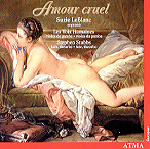Everyone seems to be having fun here, and that’s a good thing. And there’s no question that soprano soloist Suzie LeBlanc, who we’ve heard on many other early music recordings and who’s made a specialty of music from this period (17th and 18th centuries), has a fine voice–lovely round, warm sound–and knows how to use it expressively and accurately. Her partners, the duo viola da gambists known together as Les Voix Humaines and lute/theorbo player Stephen Stubbs, also are among the more experienced and acclaimed practitioners of song repertoire, appearing on numerous recordings both as accompanists and soloists. So what’s wrong with this nicely programmed, intimately and warmly recorded disc? First, the repertoire–17th century French songs mostly concerned with the “sweet torments” and cruelties of love–by definition is moody and emotional, fraught with longing, wounded victims wallowing in their bitter (yet somehow also delicious) suffering state. Thus, it takes some very special vocal magic to keep us actively interested after about 10 minutes–and I’m saying this as one who loves wallowing in musical expressions of sorrow and brooding melancholy.
LeBlanc’s way is to over-emote, to be too much in love with her lines, mercilessly stretching phrases, holding on to notes, fully exercising her right to ornament–to the detriment of her accompanists, who often have to react rather than support or enhance. I know, I know, some listeners will love this style because you really can feel the singer’s pain–and the melodies, by composers Sébastien Le Camus and Michel Lambert, really are beautiful and perfectly suited to the texts, which unfortunately are printed only in French. The gamba duo performs works by Sainte-Colombe, but even here, with all the stretching of phrases and heavy leaning on notes for emphasis, we quickly lose the forward motion, the essential thread of the music. This is the kind of thing that’s probably much better to experience in person–a little eye contact can make a huge difference. However, if you’re just itching for some “sweet chagrin” in musical form, I’d suggest countertenor Daniel Taylor’s Lie Down Poor Heart (Dorian), Andreas Scholl’s English Folksongs & Lutesongs (Harmonia Mundi), or tenor John Potter’s delightfully dark, wonderfully weird recording of Dowland songs (with lute–played by the same Stephen Stubbs, soprano saxophone, bass clarinet, baroque violin, and double bass!) on ECM, appropriately titled In Darkness Let Me Dwell.
































